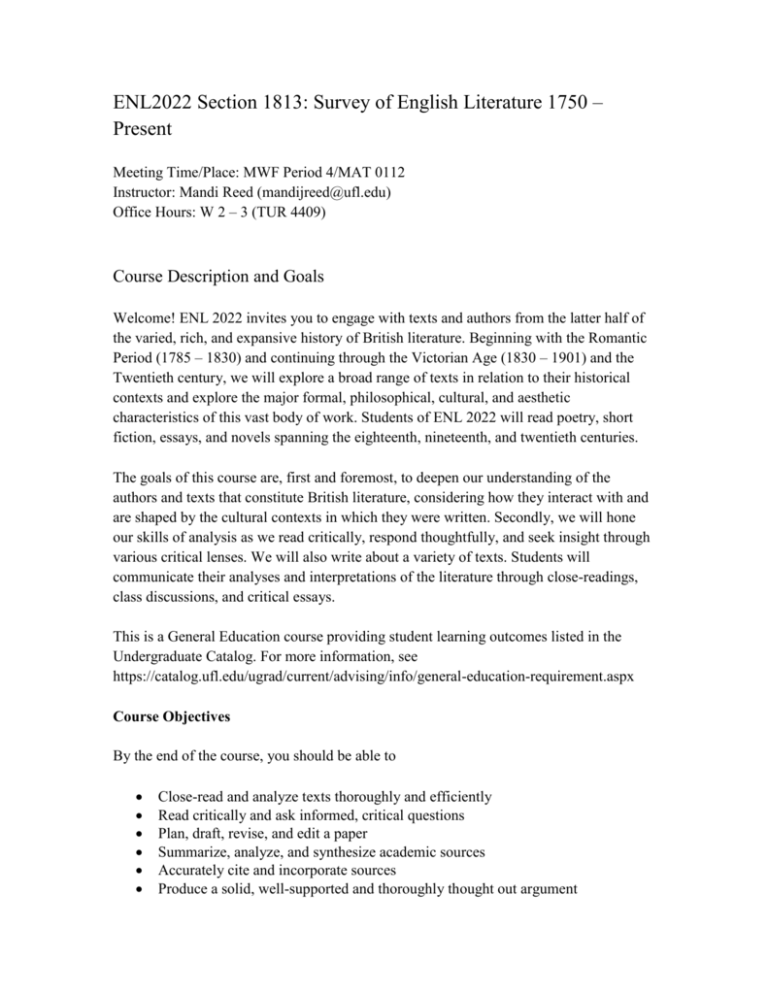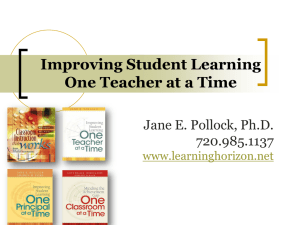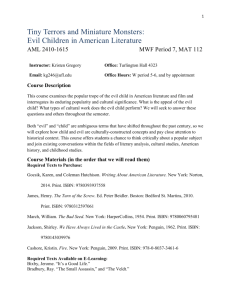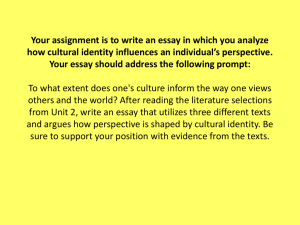ENL 2022, Section 1813, Reed - Department of English
advertisement

ENL2022 Section 1813: Survey of English Literature 1750 – Present Meeting Time/Place: MWF Period 4/MAT 0112 Instructor: Mandi Reed (mandijreed@ufl.edu) Office Hours: W 2 – 3 (TUR 4409) Course Description and Goals Welcome! ENL 2022 invites you to engage with texts and authors from the latter half of the varied, rich, and expansive history of British literature. Beginning with the Romantic Period (1785 – 1830) and continuing through the Victorian Age (1830 – 1901) and the Twentieth century, we will explore a broad range of texts in relation to their historical contexts and explore the major formal, philosophical, cultural, and aesthetic characteristics of this vast body of work. Students of ENL 2022 will read poetry, short fiction, essays, and novels spanning the eighteenth, nineteenth, and twentieth centuries. The goals of this course are, first and foremost, to deepen our understanding of the authors and texts that constitute British literature, considering how they interact with and are shaped by the cultural contexts in which they were written. Secondly, we will hone our skills of analysis as we read critically, respond thoughtfully, and seek insight through various critical lenses. We will also write about a variety of texts. Students will communicate their analyses and interpretations of the literature through close-readings, class discussions, and critical essays. This is a General Education course providing student learning outcomes listed in the Undergraduate Catalog. For more information, see https://catalog.ufl.edu/ugrad/current/advising/info/general-education-requirement.aspx Course Objectives By the end of the course, you should be able to Close-read and analyze texts thoroughly and efficiently Read critically and ask informed, critical questions Plan, draft, revise, and edit a paper Summarize, analyze, and synthesize academic sources Accurately cite and incorporate sources Produce a solid, well-supported and thoroughly thought out argument Organize your ideas efficiently Seamlessly incorporate research into your analysis Critique and revise your own writing Give written and oral feedback to peers Write clear and concise sentences Understand proper punctuation Required Texts: These are the preferred editions for this course. You may purchase a different edition if you prefer (i.e. older editions, electronic versions, etc.), as long as the edition is complete and unabridged. Please note, however, that if you choose to do so your page and/or chapter numberings will most likely vary from the paperback copies I will use in class. The Norton Anthology of English Literature, 9th edition ed. Stephen Greenblatt, ISBN-10: 0393913015 Sense and Sensibility by Jane Austen, ISBN-10: 0141439661 Jane Eyre by Charlotte Bronte, ISBN-10: 0199535590 Mrs. Dalloway by Virginia Woolf, ISBN-10: 0156628708 List of Assignments 10 Response Papers (200 words each, 200 points total) Throughout the semester, you will be expected to write and submit 10 brief papers that respond to a reading of your choice. These papers should analyze the readings and address larger concerns brought to mind by the source material. To receive credit, response papers must be submitted prior to the class period in which we will discuss the primary text. If you are late to class, you should not expect that your paper will be accepted. Please note: The last day to submit response papers is Friday, April 10. Essay 1: Close-Reading/Analysis (1,000 words, 200 points) This essay will be a close reading of any text on our syllabus which appears on or before the end of Week 6. Your close reading and analysis should take the form of an academic argument; as such, your thesis should be thoughtful, original, and clear. For this essay, all evidence needed to support your thesis should come from the primary text. No outside sources are permitted in this paper. Essay 2: Researched Critical Essay (3,000 words, 400 points) This essay will be a formally researched, original, and critical analysis in which you examine one or more of the literary text(s) we have read this semester through a particular theoretical, historical, or critical lens. As in Essay 1, this paper should take the form of an academic argument and include an insightful and original thesis. In addition, you must support your thesis with textual evidence and scholarly research. Attendance/Daily Participation (200 points) The majority of our time in class will be spent reading, analyzing, and discussing the assigned texts and learning in workshops on writing and researching. For these reasons, daily and engaged participation is a priority in this course. In other words, in this class we will learn from the collective, and active participation (or lack thereof) will directly affect your grade. All students should participate every day in some fashion, whether through offering points of view, raising questions, asking for clarification, and/or writing when it is required. Participation points may also be awarded in the form of reading quizzes. Assignment Response Papers (10 x 20 points each) Essay 1: Close Reading/Analysis Essay 2: Researched Critical Essay Participation Total Points 200 200 400 200 1000 Grading Scale and Rubric Grading Scale A AB+ B BC+ 4.0 3.67 3.33 3.0 2.67 2.33 93-100 90-92 87-89 83-86 80-82 77-79 930-1000 900-929 870-899 830-869 800-829 770-799 C CD+ D DE 2.0 1.67 1.33 1.0 0.67 0.00 73-76 70-72 67-69 63-66 60-62 0-59 730-769 700-729 670-699 630-669 600-629 0-599 Grading Rubric Each assignment has its own requirements, but for each paper I will evaluate: 1. content, including argument, development, and support 2. organization, including paragraph structure, overall flow of ideas, transitions 3. mechanics, including grammar, spelling, and style. A PAPER An A-paper has a strong thesis and makes a coherent and original argument. It follows the assignment, is well-organized, communicates ideas clearly, and there are (almost) no mechanics mistakes. It meets and/or exceeds the assignment requirements. B PAPER A B-paper does the same things as an A-paper, but is somewhat lacking in one area: perhaps organization is lacking (either on the paragraph level or in the essay as a whole), the writer provided insufficient evidence or analysis of the evidence, or there are myriad mechanics mistakes. C PAPER The C-paper follows the assignment, but is lacking in two of the areas mentioned above (content, organization, mechanics). Usually, a C-paper also needs to try and move beyond a superficial engagement with the text. D PAPER The D-paper either does not follow the assignment, is lacking in all three areas, or both. E PAPER The E-paper is reserved for essays that are not turned in, or for work that is plagiarized. For more information on Grading Policies at UF, see https://catalog.ufl.edu/ugrad/current/regulations/info/grades.aspx Course Policies Participation and Attendance As stated above, regular attendance and active participation are crucial to your success in this course. Class participation includes contributing to class discussions; coming to class on time, prepared with books and homework; preparing for in-class activities; collaborating and participating in group activities; and overall working and paying close attention to the lectures and activities of the classroom. In general, students are expected to contribute constructively to each class session. Please note: if you are observed texting, accessing social media sites, doing work for a different course, or otherwise engaging in any behavior not directly related to class discussion, participation points will be deducted from your grade without warning or notice. In this course we will follow a strict attendance policy. If you miss more than six periods during the term, you will fail the entire course. The university exempts from this policy only those absences involving university-sponsored events, such as athletics and band, and religious holidays. Absences related to university-sponsored events must be discussed with me prior to the date that will be missed. Absences, even for extraordinary reasons will result in missing work that cannot be made up; therefore, absences will have a negative impact on grades. Please Note: If you are absent, it is your responsibility to make yourself aware of all due dates and required work. If absent due to a scheduled event, you are still responsible for turning assignments in on time. Tardiness: Being late is disruptive, so try to always be on time. Three incidents of tardiness will count as one absence. Moreover, if you are late on the day an assignment is due, the instructor reserves the right to consider your assignment late and therefore subject to the late-work policy. Classroom Conduct Keep in mind that UF students come from diverse cultural, economic, and ethnic backgrounds. Some of the texts we will discuss and write about engage controversial topics and opinions. Diversified student backgrounds combined with provocative texts require that you demonstrate respect for ideas that may differ from your own. Disrespectful behavior will result in dismissal, and accordingly absence, from the class. Any use of electronic devices not related to classroom learning: phones, tablets, iPods, etc. are disruptive and will not be tolerated. Please turn them off and keep them out of sight. Assignment Maintenance Responsibilities You are responsible for maintaining copies of all work submitted in this course and retaining all returned, marked work until the semester is over. Should the need arise for a resubmission of papers or a review of marked papers, it is your responsibility to have and to make available this material. Late Work Policy and Mode of Submission I do not accept late work. All papers will be submitted as MS Word (.doc or .docx) documents to E-learning/Sakai before class as well as a stapled hard copy on the designated due date. I may consider extenuating circumstances, but you must contact me at least twenty-four hours before the assignment is due. All assignments and postings should be polished and presented in a professional manner. All papers must be in 12-point Times New Roman font, single-spaced with 1-inch margins and numbered pages. Format your assignments according to MLA standards. Final Grade Appeals Students may appeal a final grade by filling out a form available from Carla Blount, Program Assistant in Department of English. Grade appeals may result in a higher, unchanged, or lower final grade. University Policies General Education This is a General Education course providing student learning outcomes listed in the Undergraduate Catalog. For more information, see https://catalog.ufl.edu/ugrad/current/advising/info/general-education-requirement.aspx Statement of Composition (C) and Humanities (H) Credit This course can satisfy the UF General Education requirement for Composition or Humanities. For more information, see: https://catalog.ufl.edu/ugrad/current/advising/info/general -education-requirement.aspx Statement of Writing Requirement This course can provide 6000 words toward fulfillment of the UF requirement for writing. For more information, see: https://catalog.ufl.edu/ugrad/current/advising/info/writing-and-math-requirement.aspx Students with Disabilities The University of Florida complies with the Americans with Disabilities Act. The Disability Resource Center in the Dean of Students Office provides information and support regarding accommodations for students with disabilities. For more information, see: http://www.dso.ufl.edu/drc/. The office will provide documentation to the student who must then provide this documentation to the instructor when requesting accommodation. Statement Concerning Sexual Harassment UF provides an educational and working environment that is free from sex discrimination and sexual harassment for its students, staff, and faculty. For more about UF policies regarding harassment, see: http://www.hr.ufl.edu/eeo/sexharassment.htm Statement Concerning Course Evaluations Students are expected to provide feedback on the quality of instruction in this course by completing online evaluations at https://evaluations.ufl.edu. Evaluations are typically open during the last two or three weeks of the semester, but students will be given specific times when they are open. Summary results of these assessments are available to students at https://evaluations.ufl.edu/results/. Statement Concerning Academic Honesty Plagiarism is a serious violation of the Student Honor Code. The Honor Code prohibits and defines plagiarism as follows: A student shall not represent as the student’s own work all or any portion of the work of another. Plagiarism includes (but is not limited to): a.) Quoting oral or written materials, whether published or unpublished, without proper attribution. b.) Submitting a document or assignment which in whole or in part is identical or substantially identical to a document or assignment not authored by the student. (University of Florida, Student Honor Code, 15 Aug. 2007 <https://www.dso.ufl.edu/sccr/process/student-conduct-honor-code/>) All students must abide by the Student Honor Code. For more information about academic honesty, including definitions of plagiarism and unauthorized collaboration, see: http://www.dso.ufl.edu/sccr/honorcodes/honorcode.php Course Schedule This schedule is tentative and subject to change throughout the semester. All assignments and readings are due the day they are listed. Make sure to check your e-mail and Sakai regularly for announcements and updates. The Romantic Period (1785 – 1830) Week 1: January 6 – 9 W Introductions / Review syllabus, expectations, and assignments F The Spirit of the Age: Introduction to the Romantic Period; Read Mary Wollstonecraft, excerpt from A Vindication of the Rights of Woman (1792) Week 2: January 12 – 16 M “Emotion Recollected in Tranquility” Read William Wordsworth, selections from: Preface to Lyrical Ballads (1802), “Lines written a few miles above Tinturn Abbey” (1798) Drop/Add ends at 11:59 pm W Read Wordsworth, The Prelude, Book First (1799), “Ode: Intimations of Immortality” (1807), “The world is too much with us” (1807) F Genius, Friendship, and Loss Read Samuel Taylor Coleridge, selections from Biographia Literaria (1815 – 1817), “Dejection: An Ode” (1802), “Rime of the Ancient Mariner” (1798) Week 3: January 19 – 23 M MARTIN LUTHER KING DAY: NO CLASS W Jane Austen Read Sense and Sensibility Volume 1 (Chapters 1 – 22) F Sense and Sensibility Volume II, Chapters 1 – 7 Week 4: January 26 – 30 M Sense and Sensibility Volume II, Chapters 8 – 14 W Sense and Sensibility Volume III, Chapters 1 – 8 F Sense and Sensibility Volume III, Chapters 9 – 16 Week 5: February 2 – 6 M Second Generation Romanticism - What is a Poet? Read Percy Bysshe Shelley, selections from A Defence of Poetry (1821) W Inspiration, Mutability, and the Sublime Read P. Shelley, “Mutability” (1816), “Mont Blanc” (1817), “Ozmandias” (1818), “Ode to the West Wind” (1820) F Read Mary Shelley, “The Mortal Immortal” (1834) Week 6: February 9 – 13 M Masculinity, Morality, and The Byronic Hero Read George Gordon, Lord Byron, excerpts from Childe Harold’s Pilgrimage W Childe Harold’s Pilgrimage, continued F Melancholy Read John Keats, “Ode to a Nightingale (1819), “Ode on Melancholy” (1820), “Bright Star” (1819, 38) CLOSE READING/ANALYSIS DUE The Victorian Age (1830 – 1901) Week 7: February 16 – 20 M Introduction to the Victorian Period W Victorian Poetry Read Alfred, Lord Tennyson, “The Lady of Shalott” (1832); Matthew Arnold, “Dover Beach” (1867) F Victorian Poetry, cont. Read Elizabeth Barrett Browning, “The Cry of the Children” (1843); Christina Rossetti, “Goblin Market” (1862) Week 8: February 23 – 27 M “The Woman Question” Read Coventry Patmore, excerpt from “The Angel in the House” (1854 – 62); John Ruskin, excerpt from “Of Queen’s Gardens” (1865) W George Eliot, excerpt from “Silly Novels by Lady Novelists” (1856) F Read Charlotte Bronte, Jane Eyre Volume 1, Chapters 1 – 7 Week 9: March 2 – 7 M SPRING BREAK: NO CLASS W SPRING BREAK: NO CLASS F SPRING BREAK: NO CLASS Week 10: March 9 – 14 M Read Bronte, Jane Eyre Volume 1, Chapters 8 – 15 W Read Bronte, Jane Eyre Volume 2, Chapters 1 – 5 F Read Bronte, Jane Eyre Volume 2, Chapters 6 – 11 Week 11: March 16 – 20 M Read Bronte, Jane Eyre Volume 3, Chapters 1 – 6 W Read Bronte, Jane Eyre Volume 3, Chapters 6 – 12 F Sir Arthur Conan Doyle, The Adventures of Sherlock Holmes (selection TBA) The Twentieth Century and After Week 12: March 23 – 27 M Catch up and Review W Introduction to Modernism F Read James Joyce, The Dead (1914) Week 13: March 30 – April 3 M Modernist Poetry Read Rupert Brooke, “The Soldier” (1915); D.H. Lawrence, “Piano” (1918); William Butler Yeats, “The Second Coming” (1920, 21) W Read Virginia Woolf, Mrs. Dalloway 1 – 48 F Mrs. Dalloway 48 – 85 Week 14: April 6 – 10 M Mrs. Dalloway 85 – 112 W Mrs. Dalloway 112 – end F Transitional Figures Read T.S. Eliot, “The Love Song of J. Alfred Prufrock”; W.H. Auden, “Musée des Beaux Arts” (1940) LAST DAY TO SUBMIT RESPONSE PAPERS Week 15: April 13 – 17 M Introduction to Postmodernism W Read Tom Stoppard, Arcadia F Arcadia, continued Week 16: April 20 – 22 M Wrap-up + evaluations W RESEARCHED CRITICAL ESSAY DUE






